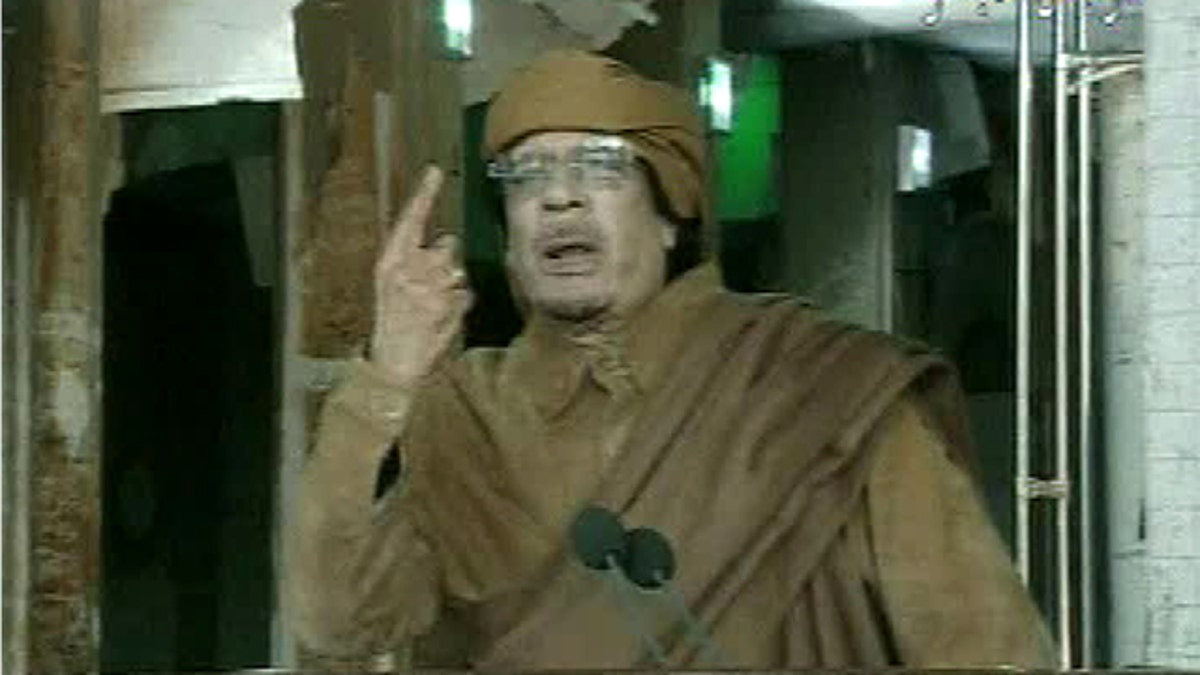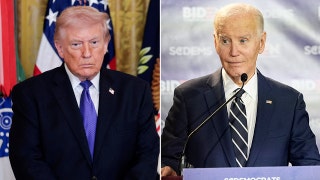
Feb. 22, 2011: This image broadcast on Libyan state television shows Libyan leader Muammar al-Qaddafi as he addresses the nation in Tripoli, Libya. (AP Photo/Libya State Television via APTN)
As turmoil in Libya rages for a seventh day Tuesday, the Obama administration so far has offered a cautious response to protesters even as it receives widespread encouragement to take stronger action against dictator Muammar al-Qaddafi.
One lawmaker, Sen. John Kerry, D-Mass., said the bloody crackdown in Libya should lead to the end of the Qaddafi regime, but the Obama administration has resisted going that far.
"This is a matter between the Libyan people and the Libyan leadership. Ultimately, they should have every right to choose who leads their country. These are not decisions for the United States," State Department spokesman P.J. Crowley said.
Not unlike the U.S. response to protests in Egypt and Tunisia, the U.S. has been tempered in its support for protesters. Secretary of State Hillary Clinton said Tuesday that the U.S. is watching the situation in Libya "with alarm" and condemned the violence.
She repeated language she used in referring to Egypt, saying the Arab government must respect "universal rights" of its citizens to assemble and speak freely and urged all parties to respond to the needs of people.
"We believe that the government of Libya bears responsibility for what is occurring and must take action to end the violence," Clinton said.
Speaking aboard Air Force One, White House Press Secretary Jay Carney said the United States is participating in meetings at the United Nations to develop a unified voice to condemn the violence in Libya, which according to the U.N. High Commissioner for Human Rights has claimed the lives of more than 250 people.
"We look forward to working with the international community so that the international community speaks with one voice in condemning the violence. And we feel like when the international community speaks with one voice, it can be most effective, so we are obviously participating fully in that," Carney said.
Carney added that the administration was closely monitoring any effects on oil prices from the ongoing Middle East turmoil.
In Tunisia and Egypt, protesters were able to topple their governments quickly and with relatively few incidents of violence, a prospect that may not be as likely in Libya, where Qaddafi has sent war planes to attack demonstrators and has met calls to respect protesters with accusations of U.S. meddling and incitement.
Indeed, the strongman who came to power in 1969 delivered a fiery and defiant address Tuesday announcing that he had no intention of stepping down and employing anti-American language to suggest the chain of events in Libya was a U.S. undertaking.
"Libya is the leader of African countries, is the leader of the whole world, is the leader of America," he said, according to a Fox News translation of the speech. "And we are not scared of any cats, or any rats or any cowards. We are going to stand strong."
Saying that protesters were serving the devil -- evidently Western influencers -- he added: "Take the greasy rats out of the street … If we have to use force we will use it."
But whereas the U.S. has been reluctant to intervene in Libya, other Libyan officials are pleading for international assistance and U.S. lawmakers are adamant the Obama administration take action.
"We are asking everyone who can do anything to try to stop the regime from the crimes it is committing against the Libyan people," Deputy Libyan Ambassador to the U.N. Ibrahim Dabbashi said Monday, imploring the international community to step in.
"The United States should not remain silent in the face of Qaddafi's egregious violations of human rights," Sens. Jon Kyl of Arizona and Mark Kirk of Illinois said in a joint statement Tuesday. "We urge the president to speak out clearly in support of the Libyan people in their struggle against the Qaddafi dictatorship."
Sen. Robert Menendez, D-N.J., called on the U.N. Security Council to condemn Qaddafi's acts and for the General Assembly to expel Libya from the U.N. Human Rights Council.
In perhaps the most aggressive U.S. response so far, Sen. John Kerry, D-Mass., chairman of the Senate Foreign Relations Committee, said Qaddafi's bloody crackdown on protesters "should mean the end of the regime itself."
"It's beyond despicable, and I hope we are witnessing its last hours in power," he said in a statement.
Kerry called on the international community to put Qaddafi "on notice that his cowardly actions" could lead to future international war crime charges against him and his senior military commanders.
He urged all American and international oil companies to immediately cease operations in Libya until violence against the protesters ends. He also asked the Obama administration to consider re-imposing U.S. sanctions that were lifted during the Bush era.
"These are concrete steps that must be taken now and in the days ahead to show that the world will respond with actions not just words when a regime wields reprehensible violence against its own people."
The White House was noncommittal about Kerry's proposals.
"We're looking at his proposals but are focused today on need to end the bloodshed and for the government to respect the universal rights of the Libyan people," Carney said.
The White House drew fire for its muddled response to the uprising in Egypt as it struggled to balance its support for a pro-democracy movement with fears of U.S. interests being harmed by a too-hasty exit by President Hosni Mubarak. Its mild response to the 2009 election outcome in Iran has also been widely viewed as a missed opportunity.
Aaron Miller, a former Clinton administration official and an expert on the Middle East, told Fox News that Qaddafi will likely be forced to step down at some point, but only if he is faced head-on.
"Until now he's never faced such a formidable challenge. Whether he's crazy, whether he's a lunatic, whether he's deranged -- all of it is irrelevant. This man believes he can surmount his current travails. And until the Libyan people or the military or somebody takes him out, he will," he said.












































